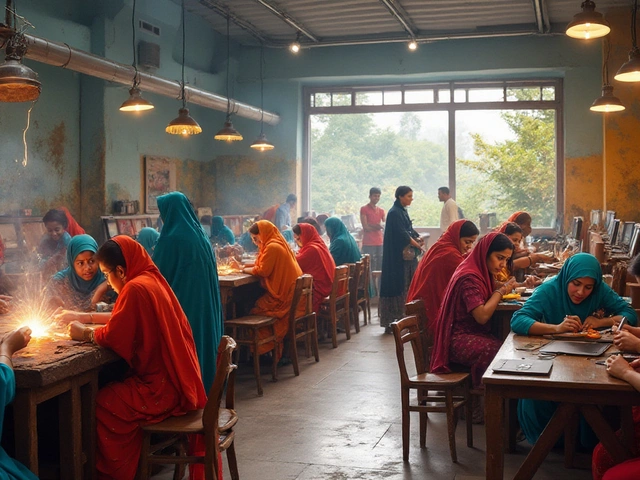India isn’t just playing catch up with the big leagues anymore—it’s rewriting the rulebook for the future of work. Ask someone in Delhi or Bengaluru what the best industry to join is and you’ll find the debates are heated over chai, not because there isn’t an answer, but because there are just so many possibilities now. Which sector really offers the best shot at long-term money, security, and satisfaction? Fasten your seatbelts, because India’s future is turning out to be anything but boring.
How Technology and Innovation Are Shaping New Career Opportunities
The tech sector’s rise in India over the last twenty years isn’t news, but how it keeps changing is. There was a time when “joining IT” just meant coding, but digital transformation has blown the playbook wide open. Today, India is the world’s hub for software exports, ranking third globally. The IT and BPM (Business Process Management) sector employs nearly 5 million people and contributed almost $250 billion to India's GDP in 2024 alone. Future industries in India aren’t just about sitting behind a computer—they span artificial intelligence, cybersecurity, cloud computing, fintech, data analytics, and more.
According to a 2024 report from NASSCOM, the demand for cybersecurity professionals has jumped by over 45% in just two years. The fintech space—think digital wallets, blockchain solutions, and micro-investment platforms like Zerodha and Paytm—has drawn more foreign investment in the past 18 months than all of Indian retail did in a decade. This trend is not slowing down. Companies want not just techies, but problem-solvers who can connect people and technology.
Here’s what sets the tech sector apart: you don’t always need a university degree to get in. Skills and certifications, especially in areas like cloud computing (AWS, Azure), are far more valuable than a traditional degree. Even entry-level coders can train in three months and land jobs paying upwards of ₹5 lakh a year. Side projects, hackathons, and internships play a big role, so anyone with grit and curiosity stands a chance.
Tips if you’re eyeing this sector? Dive into learning platforms like Coursera, Udemy, or India’s own upGrad. Consider specializing in AI or data science, as these sub-sectors alone are estimated to create half a million new jobs by 2028. If you can show you’ve built something yourself—be it a website or a simple mobile game—employers notice. It’s practical skills that’ll put you in the driver’s seat, not just theory.
Green Energy and Sustainability: The Next Big Wave
When you think about India’s future, it’s impossible to ignore how climate and economics have gotten so tangled together. India’s pledge to reach net-zero emissions by 2070 isn’t just a headline, it’s a revolution. Green energy—solar, wind, hydropower, biogas—has become one of the hottest job creators. More than 100,000 people found work in renewable energy in 2024 alone, and this isn’t slowing down.
One jaw-dropping statistic tells the story: India built more solar farms in 2024 than in the entire decade prior! The International Energy Agency projects India will add 50 gigawatts of solar capacity each year for the next six years. That’s a lot of panels to install, maintain, and innovate around. It’s not just engineers who are in demand: environmental policy experts, project managers, and technicians are too.
Sustainability also isn’t all about huge infrastructure. Green startups focused on water purification, waste management, and electric mobility are growing fast. Companies like Ola Electric and Tata Power have proved there’s money in clean tech. Last year, Tata Power recruited 25% more fresh graduates than the year before, the majority from non-traditional backgrounds like design and IT.
If you’re interested in this space, don’t just look for engineering courses. Consider certifications in project management, sustainable business, or environmental law. Curious about side gigs? Installation of rooftop solar panels, green auditing for small businesses, and selling eco-friendly goods can be lucrative.
If you’re a teacher or trainer, pivoting to green skills can future-proof your own career as governments roll out training initiatives for millions more workers. Whatever your background—be it logistics or marketing—green industries are opening doors to people willing to adapt, learn, and care about the planet.

Healthcare, Pharma, and Biotech: Expanding Horizons in a Post-Pandemic World
COVID-19 changed how the world thinks about health, and India’s healthcare sector is now firmly in the spotlight. There’s been an all-hands-on-deck approach to building hospitals, labs, pharmaceutical R&D, and telemedicine solutions. The number of healthcare startups doubled over just two years, and the medical devices sector is worth $15 billion now, with double-digit growth expected till 2030.
India is already a pharma giant—it’s the world’s largest vaccine producer, after all. Not just doctors and pharmacists, but biomedical engineers, health data analysts, and medical sales pros will find huge opportunities. One fascinating trend: telemedicine. Platforms like Practo and Tata Health are hiring coders, clinical experts, and even remote health coaches by the thousands. In rural parts of India, digital health outreach programs have reached 40 million patients since 2023 and plan to double that figure soon.
The biotech wave is surging too, as companies look for talent to help with everything from genomic research to green agriculture. If you have a science background, look at upskilling in bioinformatics, genetic engineering, or pharmaceutical regulation. Entry-level nurses and lab techs are earning up to 40% more than before the pandemic, according to the Indian Nursing Council.
Want to improve your odds? Pursue short courses in medical coding, health administration, or clinical trials. Hospitals and diagnostic labs look for people who can interface between medicine and technology. If direct patient care isn’t your thing, consider medical writing or public health program management. As India’s population ages and urbanizes, this sector’s growth rate is set to keep breaking records for at least a decade.
Manufacturing, Infrastructure, and the 'Make in India' Movement
Did you know that India just overtook Japan as the world’s third-largest automobile market? That’s just one sign of how manufacturing and infrastructure are surging ahead with government backing. The 'Make in India' initiative isn’t just a catchphrase—it pumped nearly $90 billion in new investments in 2024, creating wave after wave of jobs across states like Maharashtra, Gujarat, and Tamil Nadu.
This is an arena for skilled trades, engineers, logistics experts, and designers. Automobile, electronics, chemicals, and textiles are hiring at a rate that hasn’t been seen since 2010. India is now producing more smartphones than South Korea, and exporting cars to more European countries than ever before. Freshers and experienced pros alike are in high demand. Here’s a quick data snapshot:
| Industry Subsector | Growth (% Y-o-Y, 2024) | Avg Salary (per annum) |
|---|---|---|
| Automotive | 8.2% | ₹6-8 lakh |
| Electronics | 11.5% | ₹5-7 lakh |
| Textiles/Apparel | 7.3% | ₹3-5 lakh |
| Chemicals | 12% | ₹7-9 lakh |
If you want to stand out, brush up on automation technologies. Robotics, logistics management, and supply chain analytics are all hot tickets. Apprenticeship schemes are making a comeback, letting you earn and learn at the same time. Even so-called "low skill" jobs like assembly line work now require some technical knowledge, so short-term skill training pays off.
If you’re a recent graduate, think about picking up micro-credentials in areas like industrial automation, 3D printing, or quality assurance. Many companies offer on-the-job training, letting you get your foot in the door without years of experience. The key? Flexibility and eagerness to keep learning, since this sector is set to keep evolving as new tech becomes available.

Digital Marketing, E-Commerce, and the Talent Gold Rush
If the pandemic taught Indians anything, it’s that you really can buy just about anything online now—from a saree in Surat to a phone in Assam. E-commerce’s rise is phenomenal: $170 billion in market size projected for 2025, with the government aiming for 1 million new digital businesses to launch in the next five years. If you’re creative, persuasive, or like numbers, digital marketing and e-commerce are golden tickets.
Job roles have diversified. Sure, you have the classic social media managers and content writers, but now influencer managers, digital ad specialists, and conversion rate analysts are hot commodities. Platforms like Flipkart, Meesho, and Amazon are hiring both freshers and experienced talent. Social commerce—selling directly on Instagram, WhatsApp, or YouTube—is creating brand new career tracks that didn’t even exist five years ago.
One unique fact: more people start digital marketing careers every year in India than in any other country. The barriers are low—you can master SEO, paid ads, or affiliate marketing from free YouTube videos or affordable online courses. If you’re a freelancer, you can earn in dollars from international clients. And if you’re an entrepreneur, the startup ecosystem is buzzing: Bengaluru, Mumbai, and Hyderabad are producing unicorns (startups valued over $1 billion) at a record pace.
For those looking to break in, start by building your own online presence. Create a portfolio website, run some small ad campaigns for a friend’s project, or contribute content to niche blogs. Certifications in Google Analytics, Meta Ads, and other performance platforms can push you to the top of the pile. Above all, employers want creative thinkers who stay on top of trends and can adapt to algorithm changes without panicking.
Check out this quick list of in-demand digital marketing skills for 2025:
- SEO/SEM and content marketing
- Influencer and affiliate marketing
- Performance advertising (Google, Meta, Amazon)
- Social commerce management
- Analytics and conversion optimization
Digital success isn’t just about clicks and likes. It’s about understanding people and businesses—solving their problems through smart campaigns, memorable content, and clean user experiences. If you’ve got hustle, creativity, and a mind for data, this is a sector where anyone can rise quickly, with or without a traditional degree.




